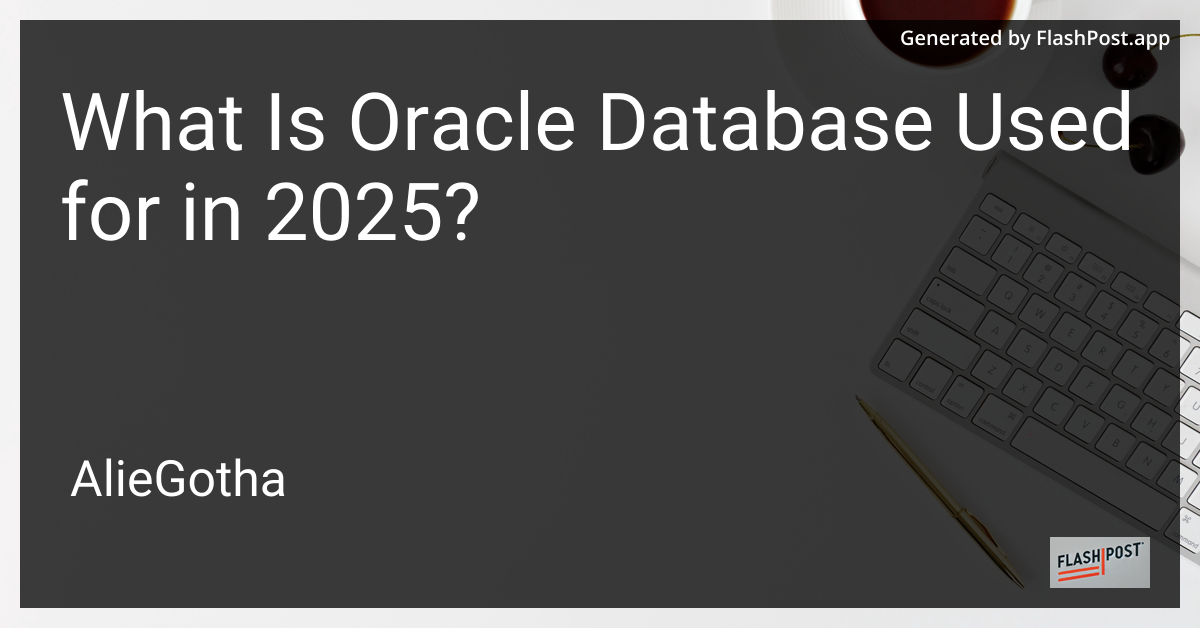

What Is Oracle Database Used for in 2025?
As we head into 2025, Oracle Database remains a crucial asset in the IT infrastructure of countless organizations worldwide. Known for its robust performance, scalability, and security features, Oracle Database continues to evolve with the changing technological landscape. In this article, we explore the key uses of Oracle Database in 2025 and its pivotal role in modern business operations.
1. Enterprise Data Management
Oracle Database is renowned for its ability to efficiently manage large volumes of data, making it an ideal choice for enterprise-level applications. With the continuous growth of IoT and big data technologies, organizations are generating unprecedented amounts of data. Oracle Database offers powerful data management solutions that ensure data integrity, consistency, and accessibility, supporting businesses in their decision-making processes.
2. Cloud Integration
The migration to cloud computing is a trend that has only accelerated. By 2025, Oracle Database has firmly established itself in hybrid and multi-cloud environments. Oracle Autonomous Database, with its self-managing capabilities, allows businesses to deploy on-premises and cloud-based solutions seamlessly. This is particularly beneficial for organizations looking to optimize their data storage costs while ensuring high availability and disaster recovery.
3. Advanced Analytics
Data analytics has become a cornerstone of strategic business planning. Oracle Database’s advanced analytics capabilities empower businesses to perform complex queries and predictive analytics, driving insights from vast datasets. Industries such as finance, healthcare, and retail leverage these analytical functions to identify trends, understand customer behavior, and improve operational efficiency.
4. Support for Oracle SQL and JSON Processing
In 2025, Oracle Database continues to be a preferred choice for executing Oracle SQL queries, thanks to its comprehensive feature set that supports everything from basic querying to complex transaction processing. Additionally, with the growing adoption of semi-structured data, Oracle Database provides robust capabilities for JSON parsing, enabling seamless integration and manipulation of JSON data within the database.
5. Scalability and Performance
Oracle Database is engineered for extreme performance, supporting applications with demanding requirements. It offers vertical and horizontal scalability options, ensuring that the database can grow alongside your business. For developers who require optimal database performance, features like partitioning, in-memory processing, and sorting results in Oracle SQL enhance query efficiency and speed.
Conclusion
In 2025, Oracle Database is indispensable for organizations aiming to harness the full potential of their data. By supporting complex data management, integration with cloud environments, advanced analytics, and high performance, Oracle Database ensures businesses stay competitive in the digital era. As Oracle continues to innovate and expand its capabilities, it remains a vital component for data-driven strategies and solutions.
Explore more about Oracle Database and its functionalities in the evolving tech landscape by checking out our related articles on Oracle SQL, Oracle JSON Parsing, and Sorting Results in Oracle SQL.
This article should serve as an SEO-optimized piece with embedded links to relevant topics for further exploration on Oracle Database in 2025.